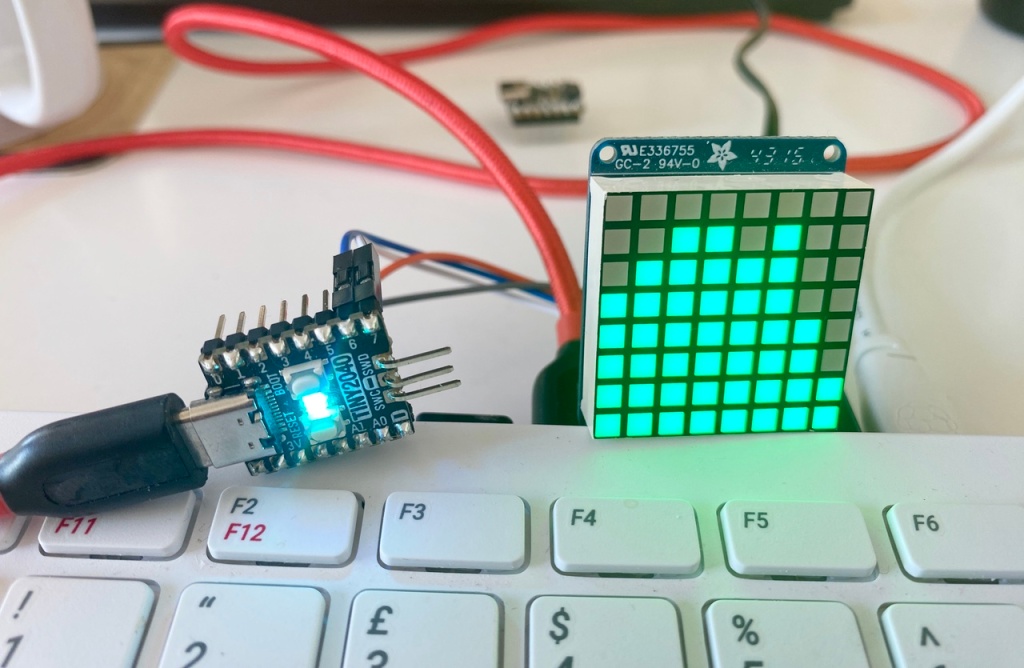A one-time colleague of mine recently put me onto Tailscale, a rather nifty product that allows you to wrangle all of your computers, phones and more into a single, secure and Internet-spanning virtual private network (VPN). I decided to give it a try and I’m very impressed with its performance and ease-of-use — the latter very important for someone like me who’s not a network guru.
Continue readingTag Archives: Raspberry Pi
Pico SDK 1.5.0 revamps IO over USB — and makes it work
The Raspberry Pi company released version 1.5.0 of the Pico SDK a week ago — right after I issued the latest version of my desktop computer-oriented I²C adaptor, which is based on the Pico’s RP2040 chip. If I’d have known about the SDK update, I would have held back — SDK 1.5.0 solves an irritating problem I’d faced with unexplained adaptor firmware hangs.

How to talk to I2C sensors, displays from… Linux
T’other week, I wrote about my work on building a Raspberry Pi RP2040-based I²C host device and some macOS client software to control it. I mentioned that I might get the latter running under Linux too. I now have, and it does.
Continue readingIntroducing C++ programming on the Raspberry Pi Pico
When I started programming the Raspberry Pi Pico, I used the C language because I’ve worked with it before. The Pico’s SDK also supports C++, but I’ve never used C++. When I started Mac programming in the early 1990s, C was the clear choice. By the time I needed to do object-oriented programming, Apple had bought NeXT and the way to do OOP on macOS was Objective-C not C++. The Pico has given me chance to join the party.

Enjoy some old school 3D arcade action — courtesy of the Raspberry Pi Pico
In the mid-1980s, I loved Phantom Slayer. Written for the Tandy Color Computer and made available for the Dragon 32, Phantom Slayer was a 3D maze shooter. Think a very basic version of Doom with colours but no textures. It wasn’t sophisticated, but it was quick and, more to the point, incredibly atmospheric.
Continue readingHail to the Acorn Atom, the Pi Pico predecessor from 1980
If the Raspberry Pi is the BBC Micro de nos jours then the Pi Pico is perhaps the spiritual successor to that earlier Acorn micro: the Atom. So in homage to that ground-breaking pre-Beeb cased computer, here’s the latest offering from Smittytone’s Retro T-Shirt Store.

Play Hunt the Wumpus, Raspberry Pi Pico style
Here’s something a little different: a basic C project that you can follow to build a fun handheld game with a Raspberry Pi Pico. Your mission: to enter a dark cave, and then locate and destroy the monstrous Wumpus.
Continue readingHow to debug a Raspberry Pi Pico with a Mac, SWD and… another Pico
When you’ve used Serial Wire Debug (SWD) to help you correct the C or C++ code running on your Raspberry Pi Pico, you’ll never want to go back to USB and the UF2 file system again. I don’t — no more messing about unplugging and re-plugging cables for me.
Continue readingHow to program the Raspberry Pi Pico in C on a Mac
Last week I tried the Raspberry Pi Pico with MicroPython. The Raspberry Pi Foundation would be sufficiently commended for providing only this level of programming support. MicroPython leverages the Python skills of the many Raspberry Pi users out there and is accessible to plenty of others too. But the Foundation has also provided a C/C++ SDK, and this opens the Pico up to serious embedded-system developers too.
Continue readingA first look at a MicroPython marvel: the Raspberry Pi Pico, in partnership with a Mac
On Thursday morning I awoke to the news that the Raspberry Pi people have entered the microcontroller board market with a new product, the Raspberry Pi Pico. Before I’d even got out of bed, I ordered a couple. Well, at £3.60 a pop, why not? I’ve now had a chance for a quick play, and here are my findings.
Continue reading





